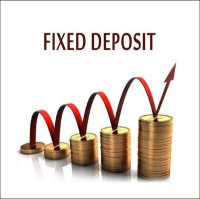9 Things That You Need to Know Before You Invest in a Fixed Deposit
Published by Sharekhan Education | July 27, 2021

9 Things That You Need to Know Before You Invest in a Fixed Deposit
Investments can be classified into two buckets: growth & safety. A good investment plan requires picking the right mix of safety and growth investments. Fixed deposits or FDs, as they are commonly known, are the most popular investments in the safety bucket.
Booking a fixed deposit means depositing your money for a fixed term with; a bank, a post office or a company for a pre-determined rate of interest with return of capital at the end of the term. A very simple and easy way to park your surplus isn’t it?
So let us understand the 9 Things that you need to know before you invest in a fixed deposit:
1. Keeps your money relatively safe:
Depending on the type of FD; corporate, bank or postal; FDs offer moderate to high level of capital safety. Postal fixed deposits are backed by sovereign guarantee while your capital is relatively safe in reputed banks. Company deposits are unsecured deposits thus the need to check their credit ratings to determine the safety of invested capital.
2. Allow you to withdraw your money before term:
This means that in case of any urgent requirement for money you can easily break you FD and convert it into liquid cash.
3. Meets your regular income need:
You can receive the interest from FDs as a periodic pay-out; monthly, quarterly, half yearly or yearly. This choice of interest pay-out makes it a favourite choice of retirees, conservative investors or those seeking regular income.
4. Choice of term:
Depending on your financial objectives, you can book a FD for as short as 7 days to as long as ten years.
5. Helps you save taxes:
The five year bank and postal fixed deposits offers tax benefits under section 80C of the income tax act for deposits of up to one lakh fifty thousand rupees under current tax rules.
6. Special rates for senior citizens:
Most bank’s & corporates offer a higher rate of return to senior citizens as compared to regular individuals.
But wait before you hop, skip or jump to the nearest bank or post office or company to book that FD let’s look at the flip side…
7. Inadequate protection against inflation:
As the returns offered are relatively lower than stock market, fixed deposits do not shield your portfolio from inflation thereby eroding the value of your money in real terms.
8. Low to Moderate Returns:
FDs are available at various rates of return which typically varies with the interest rate scenario in the country.
9. Returns are not tax efficient:
One of the biggest drawbacks of investing in fixed deposits is the taxable nature of the interest earned. Interest earned is taxable at individual tax rates. Hence for individuals falling in the highest tax bracket fixed deposits is not considered ideal investments as more than 30% of the returns are eaten away as taxes.
To wrap it up we can say that fixed deposits are popular instruments from the safety bucket offering low to moderate returns. Though they do not provide a hedge against inflation and are less tax efficient it would be good to know that fixed deposits especially bank fixed deposits prove to be a good source to park your emergency funds and can be used to generate regular income by retirees.
Happy Reading!
By enrolling in this stock market course, a learner can learn the basics and the various aspects of trading.




